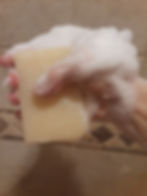5 Surprising Benefits of Goat Milk Soap
- Sheri
- Feb 1, 2021
- 4 min read
Goat milk soap is exactly what it sounds like — soap made from goat's milk. It seems recently to be gaining popularity, and with good reason. But did you know that using goat milk stems back thousands of years?

Goat milk soap is made via the traditional soap-making process known as saponification, which involves combining an acid — fats and oils — with a base called lye.
In most soaps, lye is made by combining water and sodium hydroxide. However, when making goat milk soap, goat milk is used instead of or in addition to the water, allowing for a creamier consistency due to naturally occurring fats. We chose to raise Nigerian Dwarf Goats because this breed produces the highest butterfat in their milk than any other breed of goat.
BENEFITS OF GOAT MILK SOAP
1. Gentle cleanser
Most commercially made soaps contain harsh surfactants that can strip your skin of natural moisture and oils, leaving it feeling dry and tight.
To maintain your skin’s natural moisture, it’s best to use products that don’t remove the natural fats in the skin barrier, which is why goat milk soap is so beneficial for every type of skin. This benefit is immediately noticeable, our customers tell us this regularly!

2. Rich in nutrients
Goat milk is rich in fatty acids and cholesterol, which make up a large portion of the skin membrane. A lack of these components in your skin can lead to dryness and irritation.
Goat milk contains a variety of vitamins but is particularly high in Vitamin A. Vitamin A is necessary for the body to repair damaged skin tissue and maintain healthy skin. There have been several medical studies showing that creams and soaps made with Vitamin A reduce lines and wrinkles, control acne and provide relief to sensitive skin issues.
Goat milk is rich in niacin, which recent studies have shown, helps protect your skin from sun damage. It also contains vitamins like thiamine and Vitamin B6 - which both promote healthy skin growth and maintenance. Water-based soaps can be artificially fortified with vitamins, but most aren’t. Since these soaps also don’t contain alpha-hydroxy acids, the minerals they may contain have trouble being absorbed into the deeper layers of your skin.
Finally, it’s a good source of selenium, a mineral shown to support a healthy skin membrane. It may even improve psoriasis symptoms like dry skin. But these nutrient levels vary depending on the quantity and quality of the milk used. At our farm, every bar of soap is handmade and the milk used is from our own goats who receive nothing but organic feed and hay cut from our own fields. This high nutrition under our careful watch, ensures they are never lacking in minerals. when needed, we give extra copper, selenium and other helpful vitamins and minerals to keep the goats (and their milk) in top condition.

3. Natural exfoliant
Goat milk soap contains compounds that may exfoliate your skin. This surprised me until I experienced it myself after years of using only goat milk soap.
Alpha-hydroxy (AHAs)acids are used to treat a variety of skin conditions, such as scars, age spots, and hyperpigmentation, due to their natural ability to exfoliate.
Lactic acid, a naturally occurring AHA found in goat milk soap, has been shown to gently remove the top layer of dead skin cells, allowing for a more youthful complexion.
What’s more, lactic acid is known as one of the gentlest AHAs, making it a suitable option for those with sensitive skin. We believe this is why our daughter, who has extremely sensitive skin and suffered from eczema, is completely without issues since switching to our homemade soaps years ago.
4. Supports a healthy skin microbiome
Goat milk soap may support a healthy skin microbiome — the collection of healthy bacteria on your skin’s surface.
Due to its gentle dirt-removing properties, it doesn’t strip your skin’s natural lipids or healthy bacteria. Maintaining your skin’s microbiome improves its barrier against pathogens, potentially preventing various skin disorders like acne and eczema. Also, goat milk contains probiotics like Lactobacillus, which is responsible for producing lactic acid. It has been shown to have anti-inflammatory effects in the body, including the skin.

5. May help prevent acne
We have two teenagers in the house and we can all say that, without a doubt, this has helped their acne situation. Specifically our charcoal soap with tree tea oil. But goat milk also plays a role in this. Due to its lactic acid content, goat milk soap can help control or even prevent acne.
Lactic acid is a natural exfoliant that gently removes dead skin cells, which helps keep pores clear of dirt and oil.
Goat milk soap is gentle and therefore helps maintain the skin’s moisture. This is unlike many face cleansers containing harsh ingredients that can dry out the skin, potentially leading to excess oil production and clogged pores, which was something our family experienced with over the counter products.
Goat milk soap is a gentle, traditional soap with many potential benefits.
Its creaminess lends well to conditions like eczema, psoriasis, and dry skin, as it keeps skin nourished and hydrated thanks to its non-stripping properties.
If you haven't switched to goat milk soap, now is a great time to start. If you are like most who try it, you'll never go back to the synthetic soaps!


